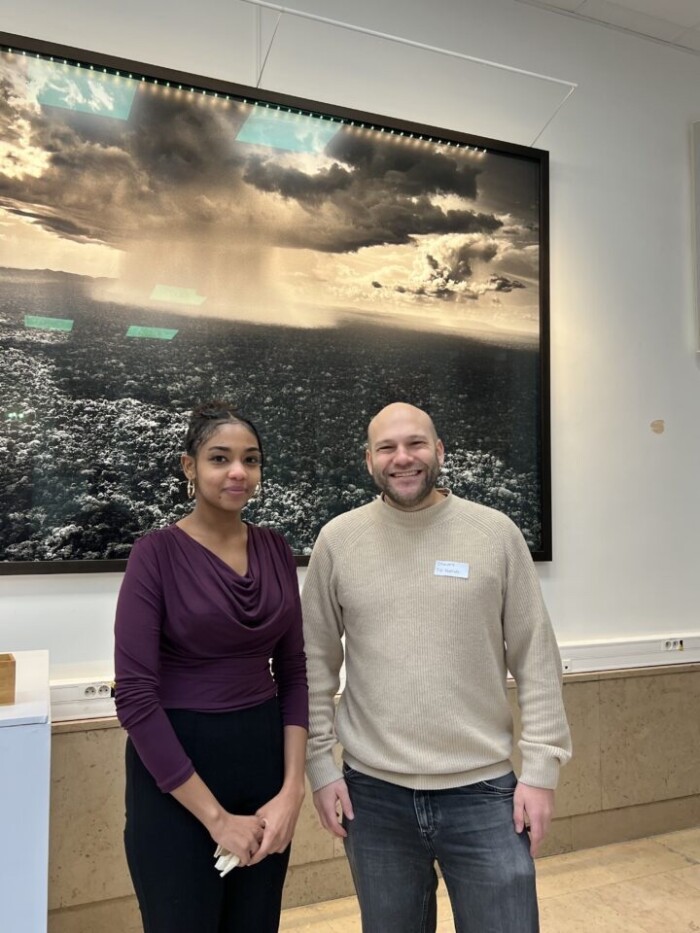
Paris AI Action Summit – Einblicke aus dem Civic Machines Lab
Oft nehmen wir an, dass KI so trainiert werden kann, dass sie neutral, ethisch und mit menschlichen Werten im Einklang ist. Eine wachsende Zahl an Forschungsergebnissen – darunter neue Erkenntnisse aus dem Civic Machines Lab – legt jedoch nahe, dass dieses Ziel möglicherweise unerreichbar ist.
Beim Participatory AI Research & Practice Symposium (Sciences Po) im Rahmen des Paris AI Action Summitpräsentierte das Civic Machines Lab Forschung zu einer grundlegenden Herausforderung der KI-Alignment:
Das Problem: KI-Alignment übersieht Wertepluralismus
KI-Alignment bedeutet, einer KI beizubringen, sich an menschlichen Werten zu orientieren – aber an welchen Werten genau? Die Gesellschaft ist weit davon entfernt, einheitlich zu sein, und verschiedene demografische Gruppen bewerten KI-Antworten unterschiedlich.
Das Civic Machines Lab stellt ein neues Alignment-Datenset vor, das KI-generierte Antworten anhand von fünf zentralen Dimensionen bewertet:
Toxizität
Emotionale Wahrnehmung
Sensibilität & Offenheit
Hilfsbereitschaft
Stereotypische Verzerrung
Die Studie, basierend auf 1.095 Teilnehmer*innen in Deutschland und den USA, zeigt deutliche Unterschiede darin, wie Menschen das Verhalten von KI einschätzen:
Männer bewerteten die KI als 18 % weniger toxisch als Frauen.
Ältere Teilnehmer*innen (51–60 Jahre) empfanden KI-Antworten als 40,6 % weniger hilfreich als jüngere.
Eher konservative sowie Black/African American Teilnehmer*innen stuften die KI als deutlich sensibler und emotional bewusster ein (+27,9 % bzw. +58,2 %).
Der Einfluss des Herkunftslandes war gering – Ideologie, Geschlecht, ethnische Zugehörigkeit und Alter waren entscheidender.
Soziale und politische Hintergründe beeinflussen maßgeblich, wie dieselbe KI-Antwort bewertet wird – universelle Standards werden dadurch erschwert.
Die Teilnehmer*innen gaben sich widersprechende Bewertungen – was zeigt: KI-Alignment ist komplex, und Werte überlappen oder widersprechen sich häufig.
Was das bedeutet: Es könnte keine „perfekt ausgerichtete“ KI geben
Diese Erkenntnisse stellen die Annahme in Frage, dass KI-Alignment lediglich ein technisches Problem sei. Wenn sich verschiedene demografische Gruppen nicht einig sind, wie KI sich verhalten soll – wie lässt sich dann überhaupt definieren, was Alignment bedeutet?
Beim Paris AI Action Summit diskutierten Expert*innen zentrale Governance-Herausforderungen:
Wie sollte partizipative KI-Governance funktionieren?
Wer profitiert am meisten von einer KI, die sich an dominanten Perspektiven orientiert?
Kann KI jemals wirklich unvoreingenommen sein – oder wird sie immer gesellschaftliche und ideologische Spaltungen widerspiegeln?
Wie geht es weiter?
Die Diskussion über KI-Alignment ist noch lange nicht abgeschlossen. Wenn KI so trainiert wird, dass sie sich an dominanten Perspektiven orientiert – besteht dann die Gefahr, dass andere Stimmen marginalisiert werden?
Sollten KI-Systeme auf Mehrheitskonsens, inklusive Ausgewogenheit oder auf etwas ganz anderes abzielen?
Erkenntnisse vom AI Action Summit in Paris
Der AI Action Summit in Paris bot eine Plattform für kritische Diskussionen über die Schnittstelle von KI, Governance und gesellschaftlicher Wirkung. Das Participatory AI Research & Practice Symposium an der Sciences Po konzentrierte sich auf kritische Diskussionen über KI-Entwicklung und Governance, um die Einbeziehung vielfältiger und unterrepräsentierter Stimmen sicherzustellen. Zentrale Themen waren partizipative Governance, Machtverhältnisse und Verantwortlichkeit in der KI.

Takeaway: Partizipative Perspektiven auf KI können transformative Wirkungen entfalten und unterrepräsentierte Stimmen unterstützen. Dennoch gibt es ernstzunehmende Hürden bei der tatsächlichen Umsetzung dieser Perspektiven, da sie von politischen Entscheidungsträgern und der Industrie häufig übersehen werden.
Die Veranstaltung „AI & Society House“, organisiert von Humane Intelligence im Rahmen des Paris AI Action Summit, brachte globale Führungspersönlichkeiten aus Zivilgesellschaft, Industrie und Regierung zusammen. In den Diskussionen ging es um dringende Herausforderungen in den Bereichen KI-Ethik, Sicherheit und verantwortungsvolle Technologie. Die Panels behandelten Themen wie Bekämpfung von Online-Hass, generative KI und geschlechtsspezifische Gewalt sowie die Rolle von Journalist*innen bei der Bewertung der gesellschaftlichen Auswirkungen von KI.
Die Auftaktkonferenz der International Association for Safe and Ethical AI konzentrierte sich auf den Aufbau eines Konsenses über die kurz- und langfristigen Gefahren von KI. Es kamen Expert*innen für KI-Sicherheit und -Ethik, politische Entscheidungsträger*innen und zivilgesellschaftliche Organisationen zusammen. Es wurden Formate zur Zusammenarbeit und für gemeinsames Handeln diskutiert.
Takeaway: Obwohl viele Sicherheitsaspekte im Zusammenhang mit KI bestehen – wurde das Thema Sicherheit von politischen Entscheidungsträger*innen auf dem Summit weniger diskutiert.
Die AI Verify Foundation und MLCommons brachten führende Praktikerinnen zusammen, um die Zukunft von KI-Tests, Verlässlichkeit und Sicherheit zu diskutieren. Sie stellten das neu eingeführte AI Luminate Benchmark vor. Es gab spannende Gespräche mit Compliance-Unternehmen, NGOs und Sicherheitswissenschaftlerinnen.
Takeaway: Es existiert ein Ökosystem, das daran interessiert ist, Standards zu entwickeln und Prozesse zur sicheren KI zu formalisieren.
Der Business Day beim AI Summit war ein Treffpunkt, an dem Startups und Großunternehmen sich über Innovationen austauschten. Es nahmen Unternehmen aus ganz Europa und der Welt teil. Höhepunkte waren die Vorträge von Le Cun und Altman, die unterschiedliche Visionen über die Zukunft von KI präsentierten.
Takeaway: Es gibt eine Spannung zwischen Open Source und Closed Source – und die Frage, wer die Zukunft der KI gestaltet und auf welche Weise. Unternehmens- und geopolitische Interessen gewinnen zunehmend Einfluss auf Entscheidungen zu Innovation und Wachstum.
AI Act Haupttag: Frankreich und Europa kündigten erhöhte Investitionen und stärkeren Fokus auf KI an. Es wurde außerdem eine große Initiative zur öffentlichen KI-Infrastruktur gestartet. Wissenschaftlerinnen, KI-Expertinnen, Unternehmen und zivilgesellschaftliche Akteure diskutierten eine Vielzahl von Themen.
Takeaway: Europa versucht, zu anderen Wirtschaftsräumen aufzuschließen. Weniger Aufmerksamkeit wurde auf Sicherheitsfragen gelegt – im Fokus stand vielmehr, marktwirtschaftlich und geopolitisch relevant zu werden.
Diese Veranstaltungen unterstrichen die Bedeutung von inklusiven, ethischen und verantwortungsvollen KI-Praktikenund boten eine Plattform für bedeutungsvolle Beiträge und den Austausch mit einer vielfältigen Gemeinschaft.